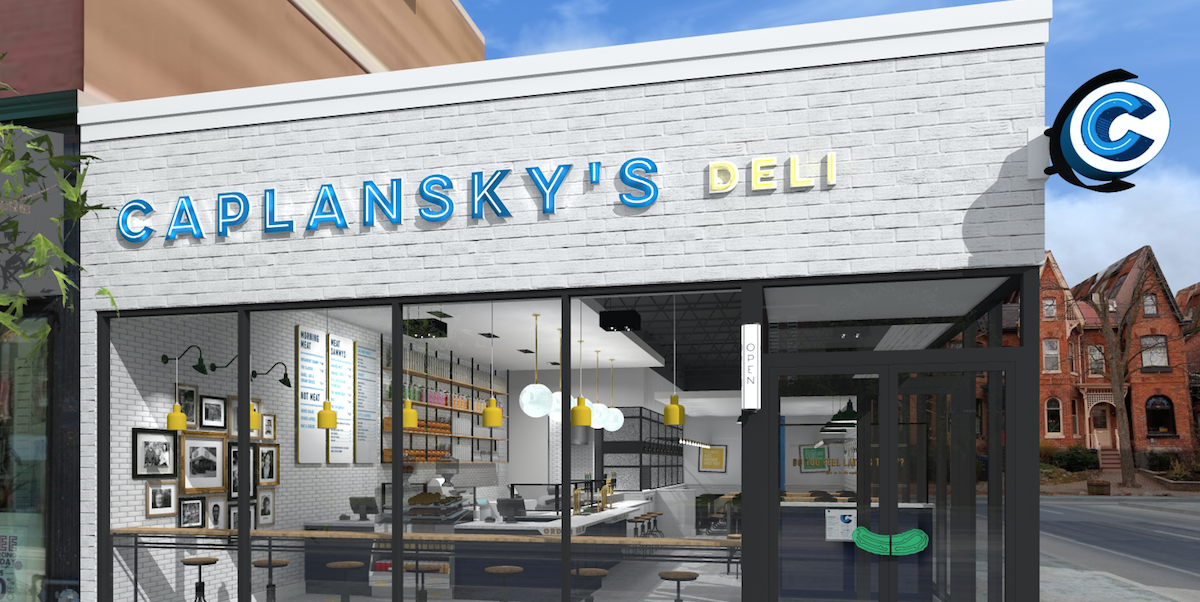Caplansky’s opened its first deli on College Street in Toronto in 2009, and two franchised locations at Pearson Airport followed in 2014. Now, owner Zane Caplansky is aiming to franchise the deli nationally, and has launched a new store concept developed by Jackman Reinvents.
Caplansky told Marketing that the most common feedback the three delis receive from customers is to open one in their communities.
“People have led us to the idea that Canada wants this—that people want to be able to experience an authentic, traditional Jewish deli in their community,” he said. On top of that, “burgers have been done, fried chicken has been done, subs have been done, Middle Eastern has been done… and no one has ever really done a great deli beyond a small, regional basis.”
Joe Jackman, CEO of Jackman Reinvents, which has a financial stake in Caplansky’s, said the goal is to bring deli to the masses in a more modern, relevant way.
“Canadian consumers – in particular young adults – are increasingly attracted to authentic brands and cultural food experiences, yet the deli category was stuck in a time warp,” he said.
“We saw an opportunity to reinvent a tired category with an ‘untraditionally traditional’ proposition and brand experience. So the new store concept reflects the unique tenets of the brand: authenticity, untraditionally traditional, and chutzpah.”
The first new-concept store is set to open in Toronto’s upscale Yorkville neighbourhood next month. The more modern-looking deli has full-length windows, off-white walls, pickles and mustard custom wallpaper, and an open food preparation area. There’s also a selection of mustards on tap, an all-you-can eat pickle bar and a vintage meat slicer.
“We’ve really tried to build a store concept that people want to just pull their phones out and start taking pictures,” said Caplansky.
The name also got a makeover, getting shortened from Caplansky’s Delicatessen to Caplansky’s Deli. The new logo has a fresher, brighter blue, as well as an enlarged “C.”
However, one of the most significant changes is that Caplansky’s has adopted a fast-casual format for its franchisees, which is different than the casual-dining format of the College Street location, said Jackman.
Fast-casual restaurants typically offer higher-quality food than a fast-food restaurant, while still maintaining quick service. In Canada, the fast-casual segment (which includes players like Smoke’s Poutinerie and South St. Burger Co.) reached $987.5 million in sales in 2014, an 8.4% increase over the previous year, according to Technomic.
“Not only is the fast-casual format one of the fastest growing restaurant segments, the format allows Caplansky’s to offer its premium sandwiches at reasonable prices because the operating cost of a fast-casual restaurant is less than that of a full service restaurant,” said Jackman.
The typical Caplansky’s franchised store will be about 2,200 square feet with 55 to 70 seats.
Jackman said Caplansky’s is targeting family neighbourhoods open to trying food from different cultures and willing to pay a slight premium for the food relative to a fast-food restaurant.
To promote the new Yorkville location, which opens May 6, Caplansky’s is holding a media event on May 5. In addition, Toronto agency Launch Pad is creating a marketing campaign, which includes social media, experiential and out-of-home.











